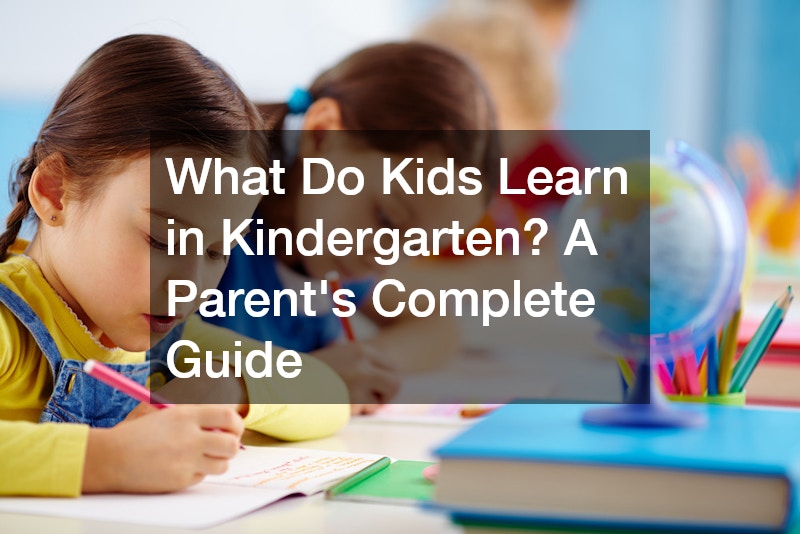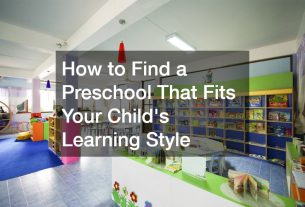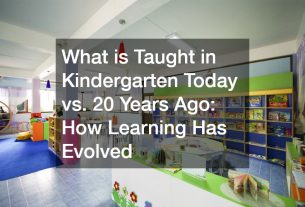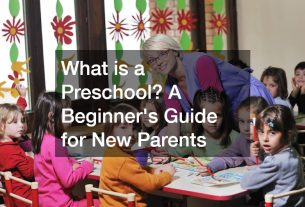
Kindergarten is one of the most important milestones in a child’s academic and personal development. It marks the beginning of formal education and lays the foundation for future learning, growth, and social interaction. For many parents, it can also be a time filled with questions and uncertainties: What exactly do kids learn in kindergarten? How can you support their growth? What should you expect from your child, their teachers, and the curriculum?
This complete guide is designed to help parents navigate the kindergarten year with confidence. We’ll break down the core academic subjects, highlight social and emotional skills, and explore developmental milestones. With this knowledge, you can better understand your child’s progress and partner with teachers to ensure a successful kindergarten experience.
What is the Purpose of Kindergarten?
At its core, kindergarten serves as a bridge between preschool and first grade. It introduces children to structured routines, classroom etiquette, and foundational academic skills. The purpose of kindergarten goes beyond just learning to read and write. It’s about nurturing curiosity, fostering independence, and helping children develop confidence in a supportive learning environment.
In kindergarten, play is still a central component of learning. Through guided activities and collaborative play, children begin to explore the world around them, develop language and problem-solving skills, and learn how to interact with others. Teachers use a balanced mix of instruction, activities, and free play to encourage holistic development.
Language and Literacy: Building the Foundations for Reading
Language and literacy are key components of the kindergarten curriculum. This is the stage where children start connecting sounds to letters, forming words, and eventually reading simple sentences. Developing these skills early on is critical for long-term academic success.
What Kids Learn:
- Recognizing and naming all uppercase and lowercase letters
- Associating letters with their corresponding sounds (phonics)
- Identifying rhyming words and syllables
- Learning to read high-frequency sight words
- Understanding the basics of sentence structure
- Writing their own name and simple sentences
Teachers often use story time, singing, and hands-on activities like letter tracing to reinforce language skills. Parents can support literacy at home by reading with their children daily and encouraging storytelling and drawing.
Mathematics: Early Number Sense and Problem-Solving
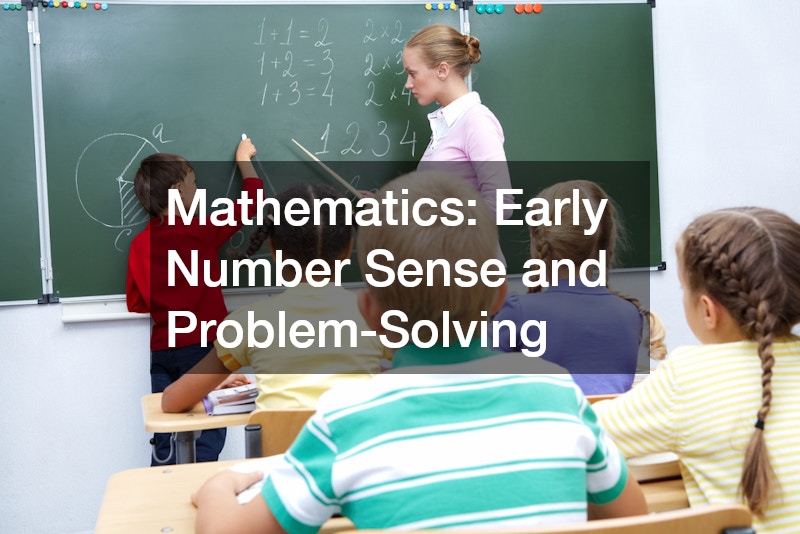
Kindergarten math isn’t about memorizing multiplication tables. Instead, it focuses on helping children develop number sense, basic arithmetic, and logical thinking. These foundational concepts make up the building blocks for future math skills.
What Kids Learn:
- Counting to 100 by ones and tens
- Recognizing and writing numbers up to 20 (or higher)
- Understanding basic addition and subtraction using visuals or manipulatives
- Comparing groups of objects using terms like “more than,” “less than,” or “equal to”
- Identifying basic shapes (circle, square, triangle, etc.) and spatial concepts (above, below, beside)
- Sorting and categorizing objects
- Understanding simple patterns and sequences
At this stage, math is typically taught through games, physical objects (like blocks or counters), and interactive activities. Parents can help reinforce these skills by counting objects at home, cooking together with measurements, or pointing out shapes during errands.
Social and Emotional Learning: The Heart of Kindergarten
Social and emotional development is a major focus during the kindergarten year. For many children, kindergarten is their first experience in a structured social setting where they must share, cooperate, and follow rules.
What Kids Learn:
- Recognizing and naming their emotions
- Managing impulses and frustrations
- Following directions and routines
- Cooperating with peers through sharing and turn-taking
- Developing empathy and kindness
- Resolving conflicts with words, not actions
Teachers create safe and nurturing environments where students learn to express themselves and build positive relationships. Circle time, group activities, and role-playing are commonly used to teach these skills.
As a parent, modeling respectful communication and encouraging your child to talk about their feelings can strengthen emotional growth. Praise their efforts and help them solve challenges calmly.
Science and Discovery: Encouraging Natural Curiosity
In kindergarten, science is all about sparking curiosity and making sense of the world. Children begin to observe, ask questions, and experiment in hands-on ways.
What Kids Learn:
- Observing changes in nature (seasons, weather, plants)
- Learning about animals and their habitats
- Exploring the five senses
- Conducting simple experiments (e.g., what sinks or floats)
- Understanding the basic needs of living things (food, water, shelter)
Science is often taught through play, nature walks, and exploration stations. Parents can support science learning by visiting parks, reading nature books, or conducting simple home experiments with their kids.
Art, Music, and Creativity: Self-Expression Through the Arts
Kindergarten places a strong emphasis on creativity and artistic expression. These subjects help children express feelings, develop fine motor skills, and improve cognitive development.
What Kids Learn:
- Drawing, painting, and crafting with various materials
- Exploring colors, textures, and patterns
- Singing songs and rhythm activities
- Playing basic instruments like tambourines or maracas
- Participating in imaginative play or storytelling
Art and music not only enhance creativity but also reinforce other academic subjects. For example, drawing shapes can support geometry, and singing songs helps with language retention. Let your child explore their creative side at home with art supplies, music, and dramatic play.
Physical Education and Motor Skills: Moving with Purpose
Physical activity plays a vital role in kindergarten development. It helps children build strength, coordination, and body awareness while teaching them teamwork and following rules.
What Kids Learn:
- Running, jumping, skipping, and climbing
- Throwing and catching balls
- Balancing and coordination exercises
- Understanding personal space and safety
- Participating in group games and team sports
Many schools have structured PE classes and daily recess. Activities are designed to develop both gross motor skills (large movements) and fine motor skills (small hand movements). Parents can encourage physical development by spending time outdoors, riding bikes, or playing active games.
What Do Kids Learn in Kindergarten About Life Skills?
In addition to academic subjects, children begin learning important life skills that promote independence and responsibility. These small tasks help build confidence and a sense of accomplishment.
Life Skills Include:
- Managing personal belongings (backpacks, lunchboxes)
- Using the restroom independently
- Cleaning up after themselves
- Following multi-step directions
- Making simple decisions
- Practicing basic hygiene (washing hands, covering coughs)
Encouraging your child to take ownership of daily tasks at home will reinforce these lessons and prepare them for greater independence as they grow.
Parent Involvement: How Can You Support Learning at Home?
Parents play a crucial role in reinforcing what their children learn in kindergarten. Active engagement, open communication with teachers, and a nurturing home environment can make a world of difference.
Tips for Supporting Learning:
- Read with your child every day
- Create a consistent routine for homework and bedtime
- Ask about their day and listen without judgment
- Celebrate small successes and progress
- Volunteer in the classroom or attend school events
- Provide opportunities for creative play and hands-on activities
When parents are involved, children are more likely to feel motivated, confident, and supported.
How to Know If Your Child Is on Track
Every child develops at their own pace, but it’s helpful to be aware of general milestones. Teachers typically conduct assessments to monitor progress in reading, math, social skills, and motor abilities.
Common Kindergarten Milestones:
- Recognizes most letters and sounds
- Reads simple words or books with guidance
- Counts to 20 and understands simple addition
- Draws basic shapes and writes their name
- Plays cooperatively with others
- Follows multi-step directions
If you’re concerned about your child’s progress, speak with their teacher. Early intervention can provide the support they need to catch up and thrive.
Preparing for First Grade and Beyond
Kindergarten is just the beginning of your child’s educational journey. By the end of the year, they should be equipped with the basic academic, social, and emotional tools to succeed in first grade.
Signs of First-Grade Readiness:
- Comfortably working in a group setting
- Following classroom routines without constant reminders
- Demonstrating curiosity and enthusiasm for learning
- Beginning to read independently
- Showing improved handwriting and fine motor control
As your child transitions to first grade, continue fostering a love of learning at home and stay engaged with their school community.
How Play-Based Learning Reinforces Academic Skills
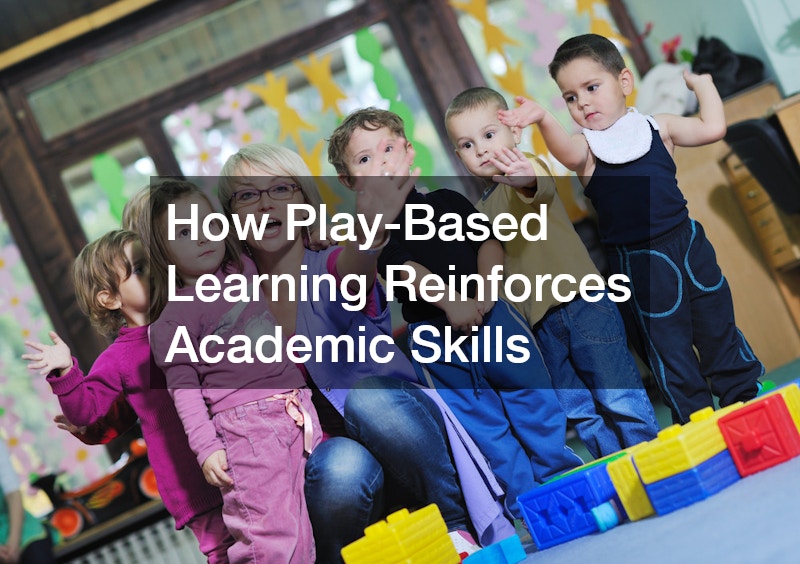
In kindergarten, play isn’t just for fun—it’s a powerful tool for learning. Through structured and unstructured play, kids explore concepts like counting, storytelling, teamwork, and spatial awareness. Activities such as building blocks, pretend play, and games help children internalize academic content in a relaxed, hands-on way that builds curiosity and confidence.
Tracking Progress: How Teachers Assess Kindergarten Learning
Kindergarten assessments aren’t like traditional tests. Teachers use informal tools such as observation checklists, portfolios, and interactive activities to track development. These assessments help identify each child’s strengths and areas for improvement. Parents are often updated through report cards, parent-teacher conferences, or even digital portfolios that showcase their child’s learning journey.
Final Thoughts: Embrace the Kindergarten Experience
Kindergarten is more than just a year of school—it’s a transformative experience that shapes your child’s future. From learning the ABCs to making new friends, the lessons taught in kindergarten go far beyond academics. They build the foundation for lifelong learning, emotional resilience, and social awareness.
As a parent, your involvement, encouragement, and understanding are key to making this a successful year. By knowing what your child is learning and how to support them, you’re setting them up for a confident, joyful, and successful start to their educational journey.
